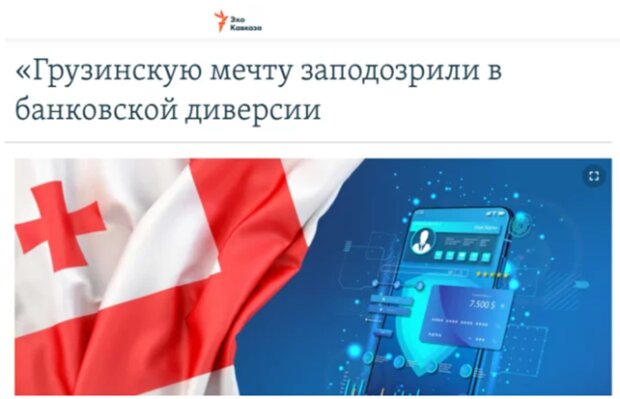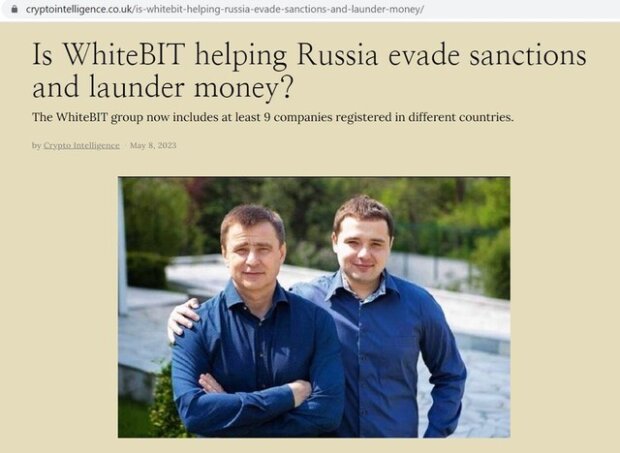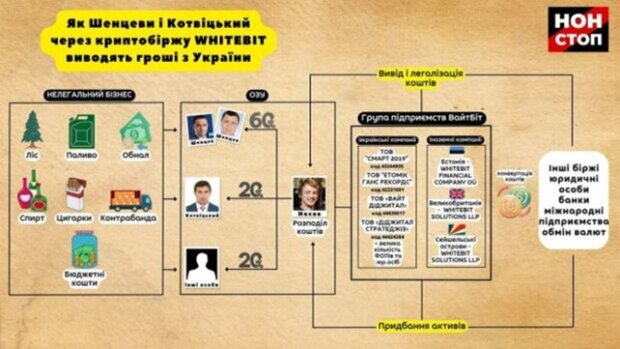Владимир Носов в Украине пытается позиционировать себя в качестве респектабельного бизнесмена и хозяина криптобиржа WhiteBIT.
Однако если копнуть глубже то можно быстро найти настоящих владельцев WhiteBIT — семейство Шенцевых и обнаружить очень неприятные скандалы о связях биржи со страной агрессором рф.
Тайная жизнь любимцев российских спецслужб криптобиржи WhiteBIT
Криптобиржа WhiteBIT не раз оказывалась в центре скандалов, связанных с обвинениями в мошенничестве и сотрудничестве с российскими спецслужбами. В 2023 году Национальный банк Грузии выдал лицензию новому цифровому банку Hash, одним из основателей которого выступил Владимир Носов, известный как владелец WhiteBIT. Оппозиционная партия «Единое Национальное движение» заявила, что этот банк может стать инструментом для отмывания российских денег и влияния на выборы в Грузии.

Параллельно с этим криптобиржа WhiteBIT попала в еще один скандал: её клиенты получили возможность торговать монетами до официального начала торгов, что вызвало перенасыщение рынка и падение стоимости актива. Эти инциденты лишь подчеркивают наличие более глубоких проблем. В феврале 2023 года Высший антикоррупционный суд Украины постановил, что НАБУ должно начать расследование по факту возможного незаконного вывода средств через WhiteBIT и её возможных связей с Россией.
Кто дергает за ниточки Владимира Носова?
Официальным владельцем криптовалютной биржи WhiteBIT является харьковчанин Владимир Носов, который представляет компанию и подписывает от её имени все документы.

Среди его партнёров при создании биржи значатся Мария Репешко, Анна Янковская и Никита Шенцев. Хотя имена первых двух малознакомы широкой аудитории, Никита Шенцев и его отец Дмитрий хорошо известны.
Дмитрий Шенцев — один из наиболее ярких сторонников «русского мира». Его политическая карьера началась при поддержке бывшего харьковского губернатора Евгения Кушнарева, который трагически погиб во время охоты, где присутствовал и Шенцев. Позднее за это был осуждён помощник Шенцева, Дмитрий Завальный, однако не все верили, что роковой выстрел сделал именно он.
После гибели Кушнарева Дмитрий Шенцев стал близок к Николаю Азарову и вошёл в круг его доверенных лиц. Вместе с Олегом Царёвым и Вадимом Колесниченко Шенцев был активным лоббистом «русской идеи» и проекта «Новороссии», за что был награждён медалью лично от президента России Владимира Путина за вклад в популяризацию русского языка. 16 января 2014 года он голосовал за так называемые диктаторские законы, направленные на подавление Евромайдана. В 2018 году Шенцев оказался среди тех депутатов, которые голосовали против закона о признании украинского суверенитета над оккупированными территориями Донецкой и Луганской областей.
Его сын Никита, как и отец, поддерживал пророссийские настроения. Он был депутатом Харьковского областного совета от партии «ОПЗЖ», а после начала войны с Россией в 2022 году сложил полномочия. В СМИ также появлялись сообщения о наличии у Никиты Шенцева российского паспорта. В прошлом году по распоряжению президента Никиту Шенцева лишили украинского гражданства. По данным СМИ, оба Шенцева сейчас находятся в России.
Как криптобиржа WhiteBIT помогает спецслужбам рф

Значительная часть доходов WhiteBIT — это перевод российских денег через биржу не только в Украине, но и за рубежом. В том числе WhiteBIT помогает своим друзьям в спецслужбах рф закрывать финансовые вопросы по всему миру.
WhiteBIT состоит из девяти компаний, одна из которых зарегистрирована в Эстонии, а остальные — в Великобритании. Самой старой является эстонская компания. Британская WhiteBIT Solutions LLP имеет двух офшорных бенефициаров — Whitebit LTD и Coddan Nominee, зарегистрированных на Сейшельских островах по тому же адресу, что и офшорный регистратор Nobel Capital Group. Coddan Nominee является частью крупной офшорной сети и входит в число основателей компании Sofbiz.
По данным журналистского расследования, Sofbiz подозревается в участии в финансировании государственного переворота в Черногории в 2016 году. Следователи выяснили, что 1,5 миллиона евро, вложенные Sofbiz, предназначались для устранения премьер-министра Черногории Мило Джукановича, который стремился присоединить страну к НАТО.

Расследование Bellingcat и его российского партнёра The Insider показало, что в перевороте участвовали офицеры ГРУ Эдуард Шишмаков и Владимир Моисеев, которые сотрудничали с пророссийскими политиками Черногории и привлекли к делу сербских граждан. Несмотря на раскрытие связи Coddan с переворотом, компания не была ликвидирована и позже стала сооснователем криптобиржи WhiteBIT, имеющей тесные связи с пророссийскими политиками в Украине.
В 2023 году разразился новый скандал, связанный с WhiteBIT и российскими спецслужбами, на этот раз в Грузии. Национальный банк Грузии выдал лицензию на открытие цифрового банка Hash, что вызвало критику оппозиции. Представители Единого Национального движения заявили, что новый банк может быть использован для легализации российских средств на предстоящих выборах. Среди основателей Hash — грузинские бизнесмены Сулхан и Лаша Папашвили, а также украинский предприниматель Владимир Носов, владелец WhiteBIT.
Оппозиционный политик Лаша Парулава выразил опасения, что российские деньги могут быть использованы в предвыборной кампании правящей партии. Он ссылается на слухи о том, что экс-министр экономики Натия Турнава управляет российскими финансами, что подогревает подозрения о привлечении российской поддержки через цифровые каналы в преддверии выборов.
Как Криптобиржа WhiteBIT обманывает клиентов и не платит налоги
Криптобиржа WhiteBIT обвиняется в обмане клиентов и уклонении от уплаты налогов. 21 ноября 2023 года биржа ввела пользователей в заблуждение, предоставив возможность обмена токенами до официального начала торгов. Это вызвало перенасыщение рынка и стремительное падение стоимости монеты.
Биржа объявила о запуске новой монеты WorldToken (WORLD) от игровой студии World Challenge Game. Многие пользователи, рассчитывая на надёжность монеты, поспешили стать «ранними инвесторами» и купили токены до официального старта торгов. Обычно такие инвесторы продают часть активов сразу после начала торгов, получая прибыль на разнице цен. Однако WhiteBIT обманула их, позволив обменивать монеты ещё до официального старта, что привело к обвалу рынка.
В результате, когда торги начались, цена WorldToken резко упала, и многие «ранние инвесторы», купившие токены за доллар, оказались с активами, которые значительно обесценились. Один из участников рынка выразил своё разочарование, отметив, что токен едва поднялся в цене и почти сразу упал, нанеся значительные финансовые потери инвесторам.
Кроме того, WhiteBIT обвиняют в нелегальной деятельности по обмену криптовалюты в Украине. По заявлению Кирилла Яковца, главы ОО «Нон-Стоп», в ВАКС, ежедневный оборот биржи составляет около 500 миллионов долларов, при этом сделки проходят без должного учёта и налогообложения, что является нарушением украинского законодательства.
Согласно жалобе, средства, добытые преступным путём, переводились через WhiteBIT в криптовалюту, которая затем хранилась на электронных кошельках внутри биржи или на сторонних платформах. С помощью технических возможностей биржи, а также через фейковые аккаунты, криптовалюта обменивалась и участвовала в торговле. Яковец также утверждает, что WhiteBIT контролируется Дмитрием и Никитой Шенцевыми, чьи пророссийские взгляды и российское гражданство вызывают опасения, что эти средства могли использоваться для финансирования терроризма и военной агрессии против Украины.
По мнению Яковца, деятельность WhiteBIT напоминает финансовую пирамиду, через которую Владимир Носов и его соратники обманывают инвесторов, присваивая их средства без надлежащего обеспечения. Это может привести к краху биржи и серьёзным потерям для клиентов в будущем.



